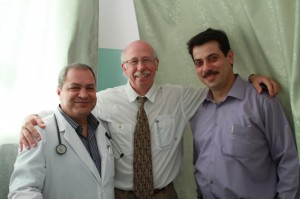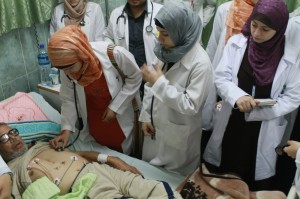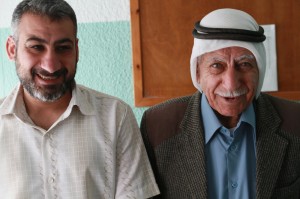Washington Physicians for Social Responsibility cardiologist makes the rounds with doctors in Gaza
As she did last year, Gerri Haynes has organized a Washington Physicians for Social Responsibility delegation of doctors and other health care providers to work in hospitals and clinics in Gaza in an effort to directly help the people there and to bring attention to the ongoing humanitarian crisis that the Israeli blockade has created. She will be sending back reports from inside the Israeli blockade.
Today’s Blog was written by Bob Haynes who is seeing cardiac patients in Gaza
Cardiac Care rounds at Al Shifa Hospital, the largest (500 beds) Palestinian hospital in the West Bank and Gaza, are similar to those at any U.S. teaching hospital. Sleep-deprived interns present a patient’s history to an entourage of medical students and quizzing professors. The interns respond correctly with answers directly from the Mayo Handbook of Cardiology.

Bob Haynes with cardiology colleagues at Al Shifa. (Bob Haynes photo)
There is a concrete wall 10 meters high around the land border between Gaza and Israel and a sea embargo enforced by the Israeli navy. Goods not allowed into Gaza by Israel an Egypt include a list of essential medical items.
One decade ago in the U.S., care for an individual experiencing a heart attack changed from dissolving heart vessel clots with medicines to opening clogged arteries with tiny balloons on catheters. Balloon technology for heart attacks is not available in Gaza. These interns are very well versed in the use of the clot-dissolving technique. Their knowledge of this methodology is elegant and complete. These interns are sharp – their knowledge is 2010, but due to available technology, their practice is limited to 1990s.

Medical students at Al Shifa Hospital examine a patient. (Bob Haynes photo)
Heroes and Families
Many physicians from Gaza leave to train abroad and are not allowed to re-enter Gaza for the six or more years of their training. Some remain abroad. Some heroes choose to return to Gaza to serve the population at home. Family membership provides a sense of meaning and purpose and belonging.
Families are identified with specific areas of Gaza. There are virtually no street names or addresses in this densely populated region. Seeking to find a specific home, the seeker questions local people about a “family” and is directed – or taken – to the correct home. Trust between a doctor and patient is established by identification of family.

An uncle and his nephew. (Bob Haynes photo)
Despite layers of politics and the suffocating siege, the people of Gaza persevere and even thrive in their own ways on their land in their families.
1 Comment to “Washington Physicians for Social Responsibility cardiologist makes the rounds with doctors in Gaza”
RSS feed for comments on this post. TrackBack URI
By Ginny NiCarthy, May 31, 2010 @ 12:40 pm
These descriptions of daily life and trauma and the hope that PSR folks bring to the people of Gaza along with practical aid are heartening. Two friend of mine have had the “balloon” treatment, which in the privileged U.S. now seems almost ordinary. It is criminal to keep lifesaving materials from people who simply want to live their lives in peace. As a post script, the photos of women in scarves learning and teaching and doing important skilled work is a welcome reminder that a scarf does not a woman make. What makes her is her courage and fortitude. Thank you. Ginny NiCarthy